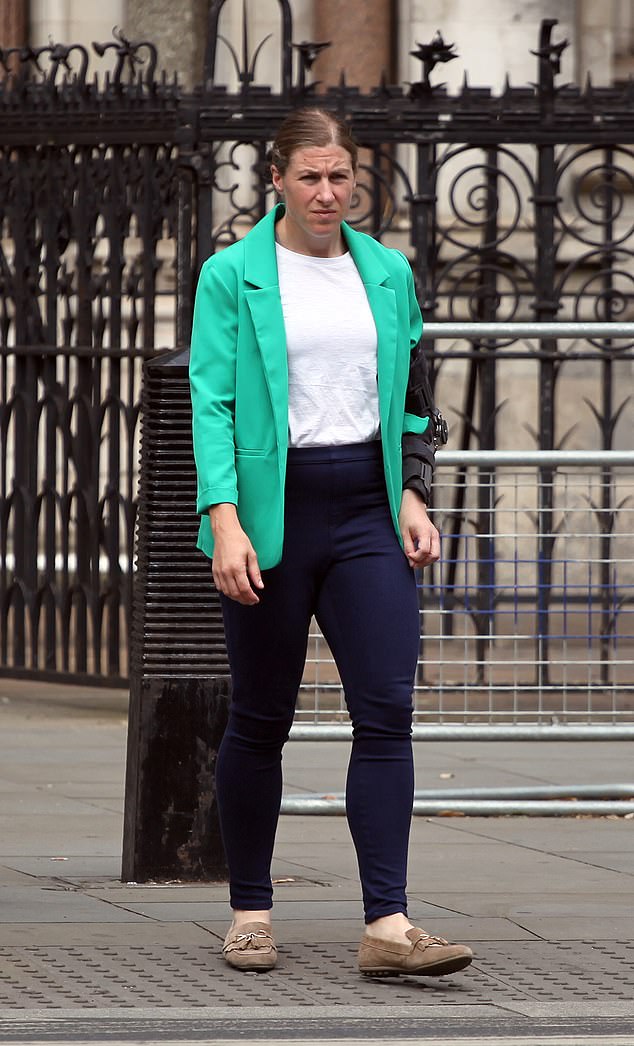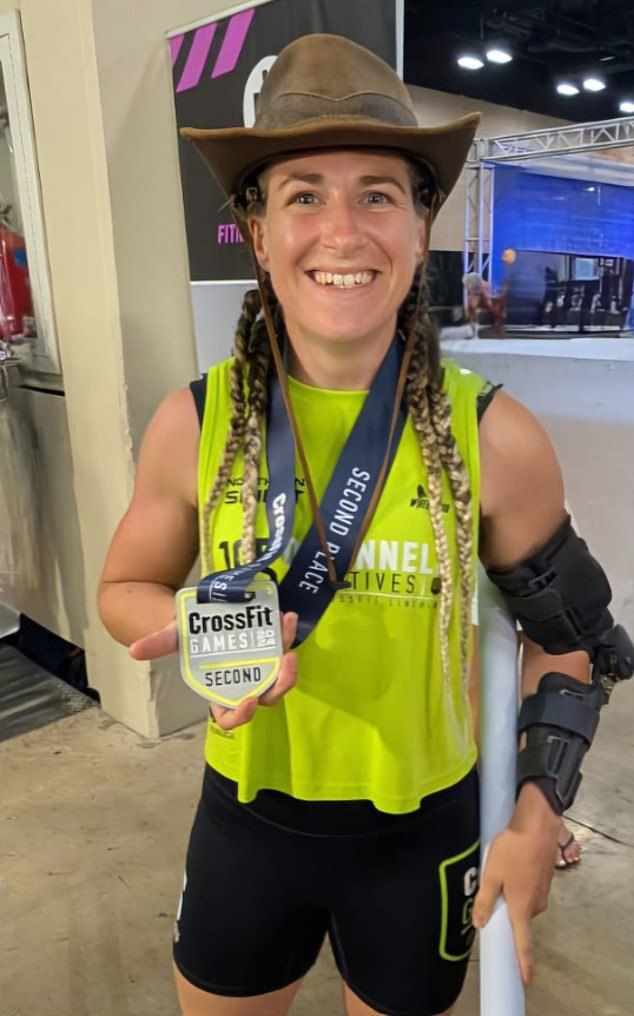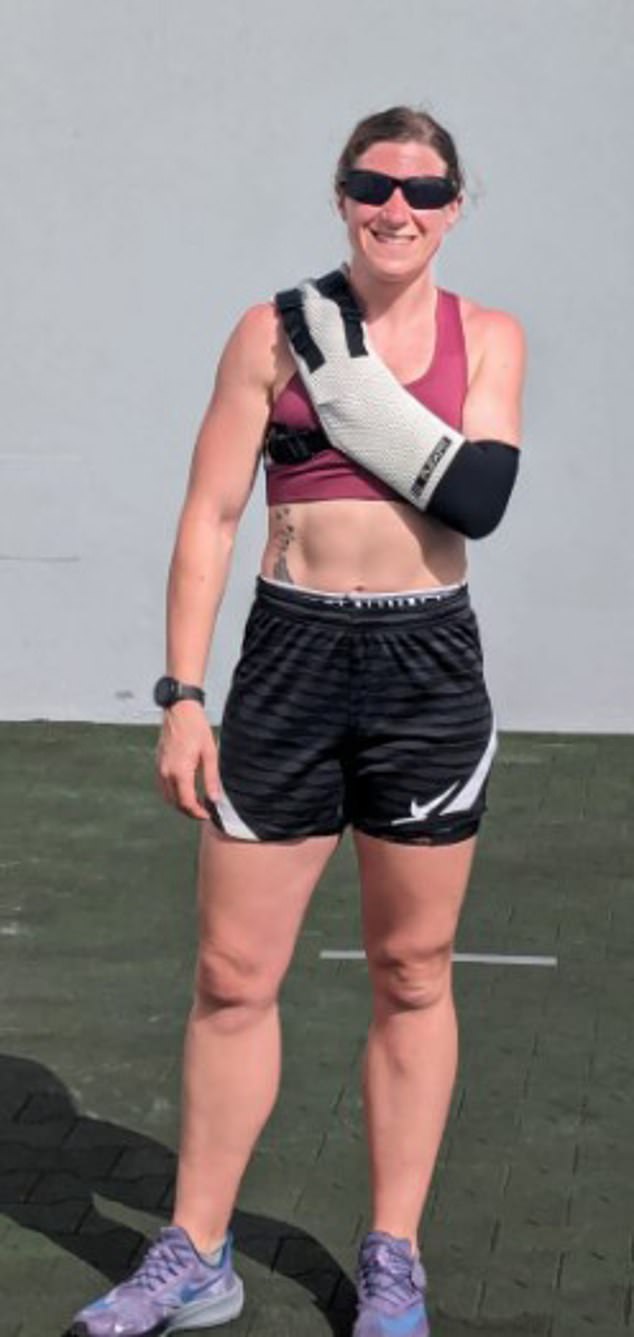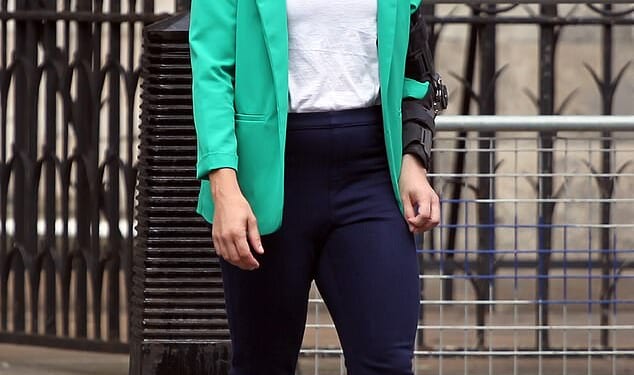A former soldier turned gold-medal winning para-athlete who sued for £1.7million after falling off an army horse has seen her ‘fundamentally dishonest’ compensation claim thrown out of court.
Debbie O’Connell had her claim dismissed by the court after she was caught on video using her injured arm leading a horse and chopping vegetables.
She previously claimed her arm was rendered ‘useless’ after falling off an army horse in 2015 and breaking her collarbone.
The 37-year-old was part of the Royal Horse Artillery’s ceremonial unit, the King’s Troop when she suffered her injury.
She subsequently left the army and began a successful para-athletics career, winning gold medals for cycling at the 2018 Invictus Games, and sprinting at world level competitions.
In September 2018, she launched a £2.4m compensation claim against the Ministry of Defence – later scaled down to £1.74m – insisting her fall was caused by riding boots which were two sizes too large and because her horse had a tendency to buck.
Ms O’Connell claimed the fall left her with little function in her arm, meaning she needs help with routine daily tasks.
The High Court heard that her grandmother even helped her clean her teeth by putting the toothpaste on the brush.
In a ruling earlier this month, Judge Christopher Kennedy KC branded her claim ‘fundamentally dishonest’ after finding that by 2022 she had ‘normal or near-normal function in [her] upper limb and shoulder’.

Debbie O’Connell outside High Court after her claim against the Ministry of Defence was thrown out

The 37-year-old was part of the Royal Horse Artillery’s ceremonial unit, the King’s Troop when she suffered her injury
He told the court: ‘I do not accept her accounts of continuing pain and hypersensitivity. I find her evidence in relation to her symptoms must be dishonest.’
The case has now returned to court, with Ms O’Connell ordered to cover the legal costs for the MoD’s defence of the claim.
Judge Kennedy ordered £195,000 to be paid up front despite Ms O’Connell’s claims that she doesn’t have the money.
The judge said he had found ‘fundamental dishonesty’ in her claim and that her dishonest conduct was ‘outside the norm.’
During the trial of the case, Ms O’Connell said shattered her left collarbone in four places, which she claimed left her with chronic pain in her left arm and shoulder.
She had been training as a mounted gunner with the Royal Horse Artillery’s King’s Troop, but ended up being discharged from the forces two years later.
The King’s Troop is a ceremonial unit of the Royal Horse Artillery, tasked with driving teams of six horses pulling First World War era cannons during high-profile public displays.
Troopers wear a distinctive blue and gold uniform dating back to the Napoleonic wars and are called on to fire the royal salutes marking grand-scale state occasions, such as the Queen’s birthday and platinum jubilee.
But disputing the claim, the MoD accused Ms O’Connell of exaggerating the impact of her injuries while ‘dishonestly’ pursuing a para athletics career in the T46 category – for competitors with limb impairments comparable with an ‘athlete with a unilateral above-elbow amputation’.

Ms O’Connell went on to become a leading CrossFit competitor after she was discharged from the army

Ms O’Connell has competed in the T46 class in para athletics – for competitors with limb impairments comparable with an ‘athlete with a unilateral above elbow amputation’
MoD barrister Niazi Fetto KC said she ‘has relied upon her dishonest pursuit of a para-athletics career in the knowledge that her condition does not fall within the T46 category.’
Giving evidence, Ms O’Connor, of Lincoln, denied being dishonest, insisting that her damages claim was genuine and that allegations of ‘cheating’ are ‘not credible’ because she fits squarely into the T46 classification.
She told the court she had simply ‘described my condition’ when asked and been given the classification.
As a soldier, she said she had been taught to ‘push through pain’ and, in pursuing her athletics career, is simply doing her best to make the most of her life, despite her injury.
She competed in the Invictus Games in 2018, winning two gold and two silver medals, before also competing in para-athletics as a sprinter and also in CrossFit, which tests the fitness and endurance of athletes.
In his judgment on the claim, Judge Kennedy said that by 2022 when the surveillance footage was shot Ms O’Connell was still reporting that she ‘needed assistance with cutting food and preparing hot drinks along with aspects of bathing and dressing/undressing. She reported that her pain remained the same as before and it restricted her daily activities’.
‘[But] the claimant’s presentation on the video is of someone with normal or near normal function in their left upper limb and shoulder,’ he said.
‘That is what I find the claimant had at that time. I do not accept her accounts of continuing pain and hypersensitivity. I find her evidence in relation to her symptoms must be dishonest.’

She was accused of exaggerating her symptoms after secret video footage showed her using her injured arm while mucking out and leading horses
Although the accident had for some time had ‘serious disabling consequences,’ there was a ‘stark’ difference between what she had told experts in the case and what she was seen doing.
‘This is a claim which I have found to be fundamentally dishonest. The claimant has persisted with her dishonesty over a long period. She has sought to engage others and her attempts to conceal the truth have been sophisticated.’
Although he found that her boots were too big, he found that did not play a part in her fall.
Last week, the case returned to court for a decision on the extent of the legal bill to be paid by Ms O’Connell, with MoD lawyers arguing that she should be made to pay at the higher rate ‘indemnity’ level.
Ms O’Connell’s barrister, Cressida Mawdesley-Thomas said that her client has ‘insufficient funds’ to meet the £195,000 ‘interim payment’ sought by the MoD.
She also pointed out that she had been successful on several ‘subsidiary issues’ in the trial, including securing a finding that the riding boots were too big.
‘This wasn’t a case which was dishonest in its inception,’ she added. ‘This was someone who did as a matter of fact suffer an injury at work, she was riding a trotting horse which bucked her off. It was found that her dishonesty started at the earliest in December 2018.’
But Judge Kennedy said the ex-soldier must pay the MoD’s court bills on the ‘indemnity’ basis, also ordering her to make a £195,000 up front payment by October 17.

She sued the Ministry of Defence after claiming she fell off the horse because her boots were too big
‘This was a case in which I found the allegation of fundamental dishonesty to be established, the conduct which I have rehearsed did indeed take this case outside the norm,’ he said.
‘She demonstrated a lack of probity and this is a suitable case for indemnity costs.’
In normal circumstances, losing claimants in personal injury cases are not made to pay the bills of the organisations they sued.
However, because Ms O’Connell was found to be ‘fundamentally dishonest,’ the MoD is entitled to enforce the order for costs to be paid.












